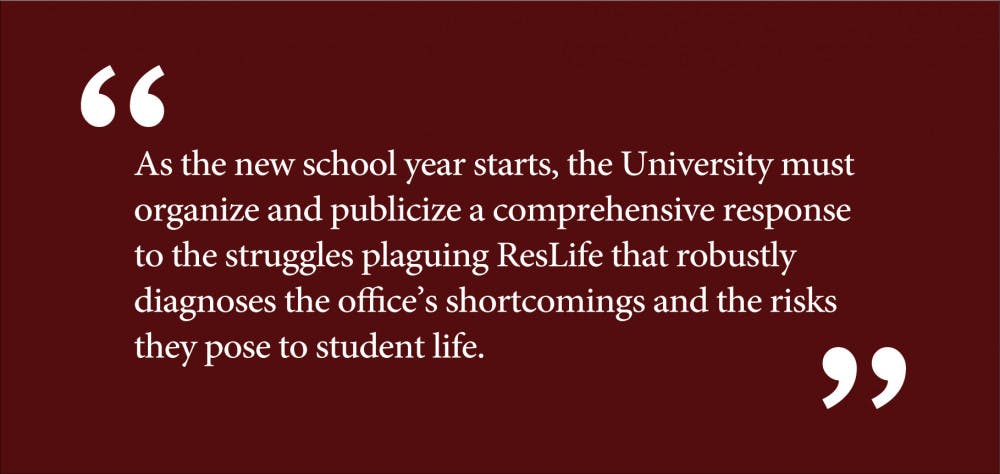This past summer, the Office of Residential Life faced a series of crippling personnel departures. Currently, ResLife has on staff only two community directors, who are responsible for managing essentially one-third of campus dormitory facilities each and training the entire 2018 cohort of Residential Peer Leaders. Four community director positions are vacant, and there is no associate director to supervise the community directors.
ResLife’s hemorrhaging of manpower has sweeping implications for various dimensions of campus life. The office’s remaining staff members have been forced to take on nearly double their typical workloads, an unsustainable arrangement that cannot possibly bode well for workplace quality and morale. And Residential Peer Leaders — enforcers of University policy and first points of contact for students in need of support — have expressed serious concern that the instruction and resources available to them will be dramatically curtailed this semester.
Indeed, it has become abundantly clear that there are long-standing, systemic problems within ResLife — which, in aggregate, jeopardize the residential experience of first-year students living in University dormitories and the wellbeing of overworked administrative staff. As the new school year starts, the University must organize and publicize a comprehensive response to the struggles plaguing ResLife, one that robustly diagnoses the office’s shortcomings and the risks they pose to student life.
To start with, persistent vacancies and this summer’s flurry of departures suggest that ResLife’s working conditions and organizational structure do not effectively prioritize the welfare and retention of its employees. For the past two years, ResLife has been chronically understaffed, and many employees have reportedly been assigned sets of responsibilities that should, ideally, be shared by a larger number of staff members. This excessive allocation of work is not healthy, exposing ResLife employees to the risk of demoralization and burnout. This distribution of labor also accelerates a vicious cycle of personnel problems: Understaffing begets more understaffing.
Relatedly, the current structure of the CD position makes it difficult to retain CDs and avoid regular staff shortages over the long term. As an entry-level position, the CD is intended to only serve in the position for three to five years, according to Mary Grace Almandrez, the dean of students. (The four CDs who left ResLife this year had had an average tenure of only 2.25 years, The Herald previously reported.) In other words, transience is embedded into the job, making it challenging to preserve institutional memory and ensure that every single available position is staffed to capacity at all times. The University should undertake a thorough reassessment of ResLife’s workplace conditions and the structural incentives of the CD position.
Chronic understaffing within ResLife also profoundly undermines the office’s mission — to realize a safe and enjoyable residential experience for students living on campus. In particular, RPLs, who must be on the front lines of conflict and crises with residents, have been trained under fundamentally unideal conditions. This training is critical for RPLs to be able to properly respond to a myriad of potential issues in our residential halls, such as incidents of racial bias or violence and critical physical and mental health emergencies. To ensure that students in on-campus residences have access to the best support system possible, RPLs must have reliable, unencumbered access to their own system of support.
Finally, the University’s response to ResLife’s staffing troubles, an external review, is disappointing. The exact details of this review — its timeframe, findings and administrative follow-up — should be shared with the public. Only then can members of the community begin to meaningfully hold ResLife to account and ensure that such sustained disruptions to residential life at Brown — such threats to the welfare of employees, RPLs and students — never occur again.
Editorials are written by The Herald’s editorial page board: Anuj Krishnamurthy ’19, Rhaime Kim ’20, Grace Layer ’20, Mark Liang ’19 and Krista Stapleford ’21. Please send responses to this opinion to letters@browndailyherald.com and op-eds to opinions@browndailyherald.com.
The views, thoughts and opinions expressed in this editorial by Stapleford, an RPL, belong solely to the author and do not express the views, thoughts and opinions of her employer, the Office of Residential Life.




